Getting to Zero
HIV IN NUMBERS
Daily 190 people in Russia learn that they are infected with HIV. During last 5 years this indicator increased almost twice.Currently cumulative number of HIV-infection being diagnosed in Russia since 1987 makes over 770 000. And it is the official statistics.
In the beginning of the HIV spread young people were the major group of risk. Lately the infection has been identified more often among people older than 30 y.o. Almost half of all new cases during last 5 years was among this age group.
"Our role is not only to provide people living with HIV with treatment but to ensure that they could work long and productively at their workplaces" Dr. Vadim Pokrovsky, Director of the National AIDS Center
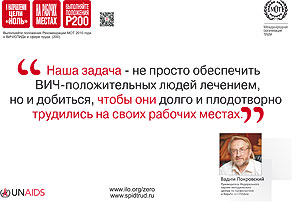
IMPORTANT
Due to the modern medicine HIV became a chronic illness. Though this disease is still untreatable the modern medicine does not let it to develop and transfer into AIDS as well as they enable working capacity and sense of well-being for decades.Experts consider that in case of regular and proper consumption of the prescribed medicine a person living with HIV can live as long as he/she would be able to live without this illness.
What is the UN “Getting to “Zero” strategy?
In 2011 United Nation Joint Programme on HIV/AIDS (UNAIDS) developed a new strategy on addressing HIV and AIDS “Getting to “Zero””. “Zero” goal contains:- Zero new HIV cases;
- Zero discrimination;
- Zero deaths associated with AIDS.
- To achieve this goal by 2015 it is important to:
- Intensify focus on efficient HIV prevention programmes;
- Enable access to treatment for everyone who needs it;
- Enable complete observance of rights for people affected by HIV and AIDS.
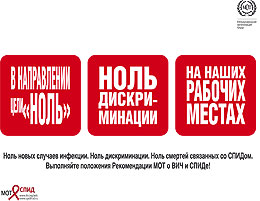
ILO involvement in implementing UN (UNAIDS) “Getting to “Zero”” Strategy
International Labour Organization and its constituents – representatives of governments, employers and workers organizations are actively involved in implementing the strategy at the workplaces. They realize information and education events in order to prevent spread of the illness and prevent discrimination of workers living with HIV."We value each worker, and their health is our common responsibility. Today HIV is not a sentence. It is important to learn of our HIV status as soon as possible to start treatment in time. Undergo voluntary and confidential HIV testing!" Boris Kravchenko, President of the All-Russian Trade Union “Confederation of Labour of Russia”
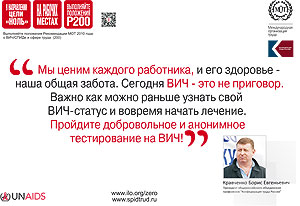
“Zero new HIV cases” at the workplaces
Human immunodeficite virus (HIV) is rather unsteady for the external impact and got enough concentration for transmission only in four liquids of the human body (blood, sperm, vaginal secret, and breast milk).In case every worker learns this information from a poster, leaflet or by watching a video that will be a first step towards prevention of the illness. Simple ways of protecting from infection will enable not only to protect themselves but will also relief from false beliefs about the illness and ways of transmission. HIV and AIDS prevention workplace programmes will provide a unique opportunity to involve a major part of the adult population.
Informed voluntary decision of a worker to go through HIV test and consulting of a medical specialist can contribute to decrease of the infection spread.
Employers and trade unions leaders at the workplaces can stimulate workers towards voluntary HIV testing with guaranteed entire confidentiality of the results. By agreement with the local health bodies the testing of workers should take place only in those medical institutions that also provide pre- and posttest consultancy.
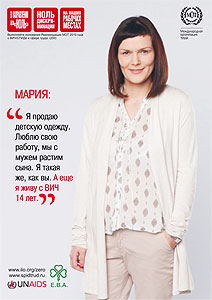 Maria Godlevskaya
Maria Godlevskaya"I sell children clothes. I like my job. I raise my son togetherwith my husband. I am like each of you. I have also been livingwith HIV for the last 14 years."
“Zero discrimination” at the workplaces
Attempts for mandatory HIV testing or violation of rights of workers based on real or perceived HIV status are not only illegal but also do not have any sensitive basis since people living with HIV cannot transfer virus within the working process.Modern health services and antiretroviral treatment medication that government provides for free to each Russian citizen enable person living with HIV to continue employment, work in profession and have a long life. Due to modern medication there is over 90 per cent possibility to have a healthy child if one of both parents live with HIV. Though it is possible only in case of timely identification of virus of the pregnant woman, regular consumption of free prescribed medication throughout pregnancy, special procedures for delivery and avoiding breast feeding. In addition woman living with HIV should not be afraid of possible dismissal or discrimination at the workplace if her visit to the AIDS Center and regular consumption of medication may reveal her HIV status to her surrounding.
“Zero new death caused by AIDS” at the workplaces
Though Russian citizens living with HIV get all medication required for HIV treatment for free the goal “zero new cases caused by AIDS” continues to be topical. Medical experts observe case of burn out of treatment among people living with HIV and share concern of reject of taking medication that can lead to inevitable death. What can be done at the workplaces in this regard? Comfortable psychological climate when a worker living with HIV is not afraid that his/her HIV-status can be revealed and when a worker living with HIV can expect to receive required help and support – are the basis for rightful and long life of people being affected by HIV.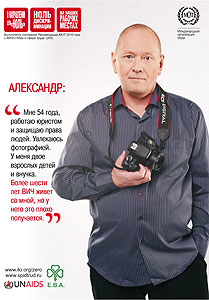 Aleksandr
Aleksandr"I am 54, I am a lawyer and I protect human rights. I enjoy photography. I have two adult children and a granddaughter. For more than 6 years HIV lives with me, but it does not succeed in it."
Why International Labour Organization is involved in addressing HIV and AIDS?
International Labour Organization (ILO) is one of the organizations within the United Nations system. Its activities are focused on increasing opportunities of women and men in achieving decent and productive employment under conditions of freedom, justice, social guarantees, and respect to human dignity. Tripartite constituents of the ILO – representatives of governments, employers and workers unions are actively involved in implementing the strategy at the workplaces. They conduct information and education activities in order to prevent spread of the disease and discrimination of workers living with HIV.As an answer for epidemich ILO developed a Code of Practice on HIV/AIDS and the World of Work in 2001. Nowdays this document became a practical guidance for developing workplace policies and programmes for workers information and education. Later in 2010 the ILO Recommendation concerning HIV and AIDS (200) was adopted, which is a first international labour standard in this area.
The ILO highlights that workers can receive information on ways of HIV prevention at the workplaces. Workers living with HIV should not have any limits in realizing their right to work.